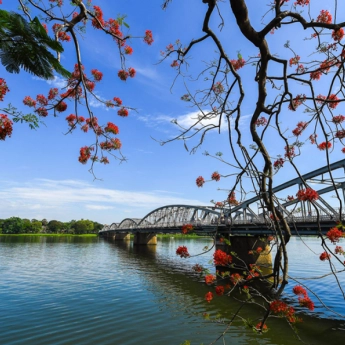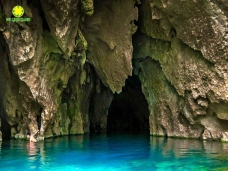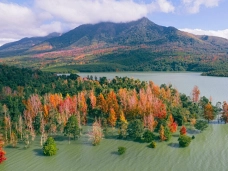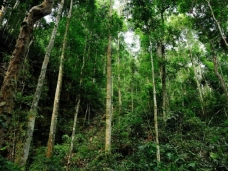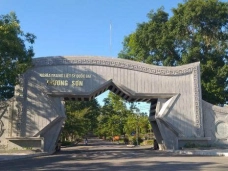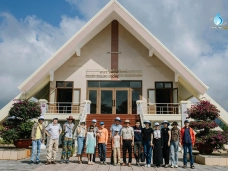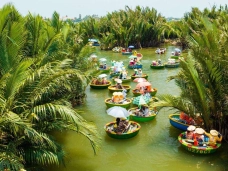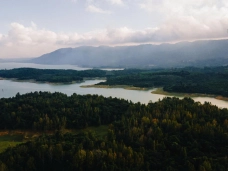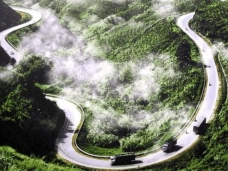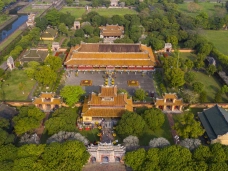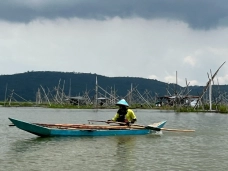Hue – A UNESCO World Cultural Heritage Site
13-05-2024 00:00
Location
Highlight Image
Hue is a historic city and one of Vietnam’s foremost cultural centers. Once the imperial capital under the Nguyen Dynasty, it served as the political and cultural heart of the nation from the 18th century to the early 20th century. Renowned for its ancient architecture, grand palaces, and historic monuments, Hue has been recognized as a UNESCO World Cultural Heritage Site.
History
For thousands of years, Thua Thien Hue has been home to diverse communities, each contributing their own cultural identity to the region. Later, it became known as Thuan Hoa - Phu Xuan, closely tied to the reign of nine Nguyen lords in southern Vietnam. In 1636, when Lord Nguyen Phuc Lan relocated his administrative seat to Kim Long, the process of urbanization began, shaping Hue into the city we know today.
Today, Hue stands as a unique travel destination, showcasing a rich tapestry of relics from Vietnam's feudal past, inviting visitors to explore its storied history and timeless charm.

Nature
Hue exudes a quiet elegance, a serene beauty shaped by its rivers, mountains, and skies. It is not just the land of the Perfume River and Ngu Mountain but a mosaic of hills, rivers, beaches, lagoons, and sand dunes. From the rolling peaks of Kim Phung, Ngu Binh, and Vong Canh to the gentle flow of the Perfume, An Cuu, and Nhu Y Rivers, Hue is a sanctuary of natural splendor. Its Chuon and Cau Hai Lagoons, the vast Tam Giang Lagoon, and iconic features like Con Hen and Gia Vien harmoniously weave together a landscape that epitomizes the essence of Vietnam’s natural beauty.
Culture
Thua Thien Hue is steeped in a rich history, vibrant culture, and proud revolutionary tradition. It has witnessed the ebbs and flows of time, serving as a meeting point and melting pot of diverse cultural values within the stream of Vietnamese heritage. Hue’s culture is a beautiful blend of urban sophistication, rural simplicity, imperial grandeur, and folk wisdom, coexisting in harmony to create an enduring legacy.
Must-Visit Destinations
Imperial Citadel of Hue: Recognized as a UNESCO World Heritage Site, the Imperial Citadel showcases the grandeur of Vietnam’s royal past. Wander through its ancient halls and majestic temples, and let the history of the Nguyen Dynasty come alive. Visitors can dress in traditional royal costumes, take part in the vibrant Hue Festival (April to June), and immerse themselves in a celebration of art, culture, and heritage.
Lang Co Bay: A jewel among Vietnam’s beaches, Lang Co Bay is known for its clear waters, soft white sands, and lush green mountains. Perfect for those seeking tranquility, it offers breathtaking natural vistas and a refreshing coastal atmosphere. Luxurious resorts and hotels dot the area, providing exceptional services for a rejuvenating getaway.
Thuy Xuan Incense Village: With a history spanning 700 years, this village in the heart of Hue is famous for its artisanal incense, including cinnamon, agarwood, and citronella scents. The vibrant bundles of incense sticks create a striking backdrop for visitors to capture stunning photos while discovering the village’s deep cultural and spiritual significance.
Thien Mu Pagoda: Also known as Linh Mu Pagoda, this 400-year-old cultural icon is perched on Ha Khue Hill, overlooking the Perfume River. Located just 5 kilometers west of Hue’s city center, Thien Mu Pagoda is a tranquil sanctuary and a symbol of Hue’s spiritual heritage, offering a serene escape for travelers.
Khai Dinh Tomb: Situated in Thuy Bang Commune, Khai Dinh Tomb is a unique blend of Vietnamese and Western architecture. Though modest in size compared to other Nguyen Dynasty tombs, it captivates visitors with its intricate details, vibrant mosaics, and profound historical significance.
Cuisine
Hue’s cuisine embodies the elegance of imperial traditions, blending delicate flavors with meticulous preparation. Each dish tells a story, reflecting the cultural depth and creativity of this historic city.
Com Hen (Mussel Rice): A humble yet iconic dish made with cold rice, sautéed mussels, crispy pork skin, shrimp paste, and aromatic herbs. Only in Hue can you experience its unique flavors, deeply rooted in the region’s culinary heritage.
Bun Bo Hue (Hue Beef Noodle Soup): A rich, spicy, and flavorful soup featuring tender beef, pork knuckles, and blood pudding. Its signature thick rice noodles and bold broth make it a must-try dish that captures the essence of Central Vietnam’s hearty cuisine.
Nem and Tre: These fermented pork dishes are staples of Hue’s culinary scene. Nem combines a tangy, savory taste with a chewy texture, while Tre is wrapped in dong leaves, offering a perfect balance of sweet and sour flavors. These traditional delicacies are ideal as snacks or gifts.
Banh Ep (Pressed Pancakes): A beloved street food, these thin, crispy pancakes are made with eggs, shrimp, or pork and grilled to perfection over charcoal. The unique preparation method gives them a delightful texture and flavor.
Hue Sweet Soups: Known for its variety, Hue offers hundreds of sweet soup options, from lotus seed and longan soups to unique combinations like mung bean dumplings and candied taro. These desserts, crafted with care and precision, leave a lasting impression on visitors.
Festivals
Hue Festival: Originating from the Vietnam-France Festival in 1992, the Hue Festival has grown into a grand cultural celebration that honors the city’s imperial legacy. From Nam Giao Rituals to Ao Dai fashion shows, kite flying, and human chess, the festival highlights Hue’s artistic and historical treasures, drawing visitors from around the globe.
Hon Chen Temple Festival: Held annually at Hon Chen Temple, this vibrant event celebrates the worship of the deity Thien Y Na. The highlight is the procession on the Perfume River, with elaborately decorated boats carrying offerings and symbols of devotion.
Thanh Tra Festival: Celebrating the harvest of Hue’s famous pomelo, this festival features fruit competitions, traditional games, and rituals honoring the land’s bounty. Visitors can enjoy the fresh produce and immerse themselves in the local agricultural culture.
Hue is a poetic tapestry of history, culture, and nature. Whether you’re marveling at imperial relics, savoring local cuisine, or joining lively festivals, Hue promises an unforgettable journey into Vietnam’s soul.
Similar destination
09-01-2026
Ruc Mon – Trekking, Cave Adventure
31-12-2025
Survival Valley – Thuy Cung Cave
15-09-2025



